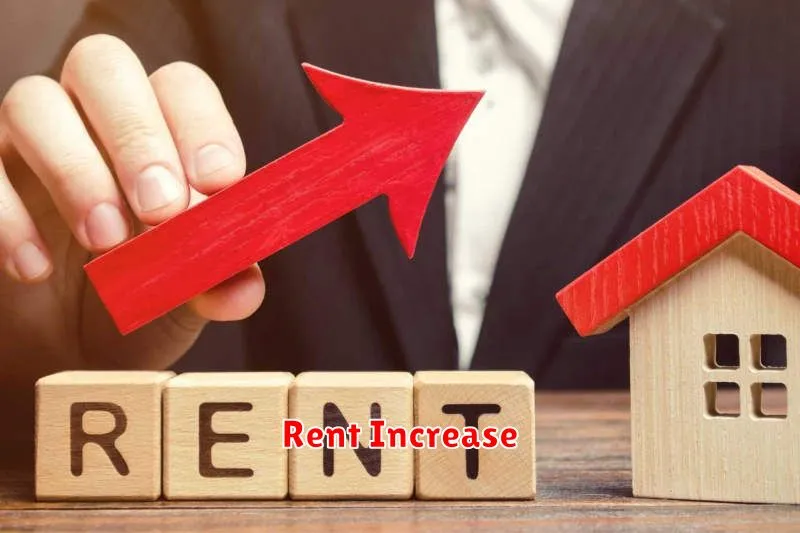Are you wondering why your rent keeps going up? You’re not alone. Rising rent prices are a common concern for tenants across the country. Understanding the factors that contribute to rent increases can help you better prepare for future adjustments and even negotiate a more favorable lease agreement. This article will explore the common drivers of rent increases and provide tips on how to manage them.
Factors Influencing Rent Increases
Rent increases are a common occurrence in the housing market, and understanding the factors that drive them is essential for both landlords and tenants. Several economic and market forces contribute to rising rents, and it’s crucial to stay informed about these factors to make informed decisions about your housing situation.
One of the primary drivers of rent increases is supply and demand. When demand for housing exceeds the available supply, landlords can increase rents to reflect the higher market value. This can be influenced by factors such as population growth, limited new construction, and economic growth in a particular area.
Another key factor is inflation. As the cost of goods and services rises, landlords need to adjust their rents to cover their increased operating expenses, such as property taxes, maintenance, and utilities. Inflation can erode the purchasing power of tenants, making it harder to afford rising rents.
Interest rates also play a significant role in rent increases. When interest rates rise, it becomes more expensive for landlords to borrow money for mortgages and renovations. These increased borrowing costs are often passed on to tenants through higher rent prices.
Property taxes are another factor contributing to rent increases. As local governments raise property taxes, landlords may increase rents to offset these additional expenses.
Market conditions can also influence rent increases. For example, a booming local economy or a growing population can lead to higher demand for housing and increased competition for rentals, driving up prices.
Finally, local regulations and ordinances can also impact rent increases. Some cities and towns have implemented rent control policies or tenant protection laws that limit the amount landlords can increase rents annually.
Legal Limits on Rent Increases
Rent increases can be a stressful topic for tenants, but laws exist to protect tenants from excessive rent hikes. These laws vary by state and even by city, so it’s important to understand the regulations that apply to your specific location.
In some areas, rent control laws set a maximum limit on how much landlords can increase rent each year. These limits can be based on factors like inflation, property taxes, or a percentage of the current rent. In other areas, landlords might be required to provide advance notice before increasing rent. This notice period gives tenants time to budget for the change or consider other housing options.
Landlords are generally required to follow specific procedures when increasing rent. These might involve providing written notice, explaining the reason for the increase, or offering a chance for tenants to negotiate. If a landlord violates these procedures, tenants may have legal recourse.
It’s crucial for tenants to stay informed about the rent control laws in their area. They should also keep records of all rent payments and any communication with their landlord regarding rent increases. This documentation can be valuable if a dispute arises.
Remember, these are just general guidelines. For the most accurate and up-to-date information on rent control and other legal limits on rent increases, it’s best to consult with a legal professional or a tenant advocacy organization in your area.
Typical Rent Increase Timeframes
Landlords are allowed to raise rent on a regular basis, but the frequency and amount of the increase can vary widely. While there are no hard and fast rules, there are some common timeframes for rent increases in the United States. It’s important to check your lease agreement and state laws, as there may be specific regulations governing rent increases in your area.
Annual rent increases are the most common type, typically occurring at the end of the lease term or on the anniversary of the tenant’s move-in date. In some cases, rent increases may occur more frequently, such as every six months or even quarterly. This frequency is usually determined by the lease agreement and local regulations.
The amount of the increase is usually determined by market conditions and the landlord’s operating expenses. In some cases, landlords may base rent increases on the Consumer Price Index (CPI), which tracks inflation. While there’s no set percentage for increases, it’s common to see increases of 2-5% annually. However, in competitive markets or when housing demand is high, increases can be higher.
It’s important to remember that rent increases are legal, but landlords must comply with the terms of your lease agreement and state laws. Be sure to review your lease agreement for specific clauses regarding rent increases and how much notice landlords must provide before raising rent. If you have any concerns or questions about rent increases, it’s always best to contact your landlord or a legal professional for guidance.
Reviewing Your Lease Agreement
When it comes to apartment rent increases, understanding your lease agreement is crucial. It outlines the terms and conditions of your tenancy, including any clauses related to rent adjustments.
Here’s what to look for when reviewing your lease agreement:
- Rent Increase Clause: This clause specifies the circumstances under which your rent can be increased, such as a predetermined annual percentage or based on market rates.
- Notice Period: Pay close attention to the required notice period your landlord must provide before implementing a rent increase. This allows you time to prepare for the adjustment.
- Renewal Options: Your lease agreement may contain provisions for renewal, which might include a different rent amount or terms.
By carefully reviewing your lease agreement, you can ensure you’re aware of any potential rent increases and understand your rights and obligations as a tenant.
Negotiating Rent Increases
While rent increases are a common occurrence, tenants can often negotiate a more favorable outcome. Communication is key. Begin by understanding the landlord’s rationale for the increase and explore alternative options. Consider factors like market rates, recent improvements to the property, and your lease terms.
Presenting a counteroffer demonstrates your willingness to compromise. Back your proposal with solid arguments, such as a history of timely payments or a willingness to sign a longer lease. If the increase aligns with market trends, negotiate for a smaller increase or a staggered implementation.
Document all communications, including emails, letters, and meeting notes. This will protect your interests if a dispute arises. If negotiations stall, consider exploring mediation or seeking legal advice. Remember, finding a compromise that benefits both parties can lead to a more positive landlord-tenant relationship.
Understanding Local Rent Control Laws
Rent control laws are designed to protect tenants from exorbitant rent increases. These laws are typically enacted by local governments and can vary widely in their application, including which areas they cover and what types of properties are subject to their regulations. In many jurisdictions, rent control laws are implemented to ensure that landlords can only increase rents by a specific percentage or by an amount tied to a specific index, such as inflation. Some jurisdictions also have limits on the total amount of rent increases that can be implemented in a given period.
While rent control laws aim to protect tenants, they can also have unintended consequences. Some landlords argue that rent control limits their ability to make necessary improvements to their properties and that it discourages them from investing in new construction. There is also a debate about whether rent control laws actually benefit low-income tenants, as some landlords may choose to rent to higher-income tenants to maximize their profits.
It is important to note that rent control laws are complex and can vary widely by jurisdiction. Tenants should research their local rent control laws and understand how they apply to their situation. If you are facing a rent increase, it is crucial to consult with a lawyer to understand your legal rights and options. It is also important to know that some jurisdictions have “just cause” eviction laws, which require landlords to have a valid reason for terminating a tenant’s lease, such as non-payment of rent or violation of lease terms. These laws can further protect tenants from arbitrary rent increases.
Evaluating Market Rent Rates
When evaluating market rent rates, it’s important to understand that rent prices are constantly fluctuating based on a multitude of factors. These factors include:
- Location: Prime locations with high demand often have higher rents compared to less desirable areas.
- Property Size and Amenities: Larger apartments, luxurious amenities, and modern finishes generally command higher rents.
- Market Conditions: Factors like economic growth, interest rates, and housing supply can influence overall rent levels.
- Seasonality: Rental demand can vary throughout the year, with higher prices during peak seasons.
- Competition: The number of available units and competition from other landlords can affect rent rates.
To accurately assess market rent rates, it’s crucial to conduct thorough research. Utilize online resources, such as rental websites, market reports, and property management databases. Additionally, consult with local real estate agents who have firsthand knowledge of the market. They can provide valuable insights and guidance on current rent trends and comparable properties.
By meticulously evaluating market rent rates, you can determine a fair and competitive rent for your property. Remember that understanding the market dynamics and staying informed about current trends are essential to optimizing your rental income.
Considering Your Options
When faced with a rent increase, it’s natural to feel frustrated and wonder about your options. Here are a few things to consider:
Negotiate: The first step is to see if you can negotiate a lower rent increase. Be prepared to present your case, highlighting your good tenancy history and any improvements you’ve made to the apartment.
Move: If negotiation isn’t an option, consider moving to a different apartment. This can be a good choice if you find a better deal elsewhere or if your current apartment no longer meets your needs. However, remember that moving involves costs like security deposits and moving expenses.
Stay Put: If you’re happy with your apartment and can afford the increased rent, staying put might be the best option. You may want to consider creating a budget to ensure you can comfortably manage the higher rent.
Talk to Your Landlord: Open communication with your landlord is crucial. Explain your concerns about the rent increase and explore any possible solutions together. They may be open to discussing alternative options or providing you with more time to adjust to the new rent.
Remember, you’re not alone in facing rent increases. By considering your options carefully and communicating effectively, you can find a solution that works best for your situation.
Budgeting for Potential Increases
Rent increases are a common occurrence, and it’s important to be prepared for them. When budgeting, it’s a good idea to factor in a potential rent increase of 3-5% each year. This will help you avoid any surprises and ensure you have enough money to cover your rent even if it goes up.
To budget for potential increases, you can use a few different strategies:
- Set aside a small amount of money each month in a savings account specifically for rent.
- Increase your rent payments by a small amount each month, even if your rent hasn’t gone up yet.
- Look for a roommate or a smaller apartment if you’re concerned about affording a potential rent increase.
By taking steps to prepare for potential rent increases, you can avoid financial stress and keep your housing situation stable.
Documenting Communication with Landlord
When facing a rent increase, it’s crucial to maintain a clear record of all communication with your landlord. This documentation serves as a vital resource if any disputes or misunderstandings arise. Documenting conversations can help you accurately recall the details of your interaction with the landlord, particularly regarding the rent increase.
It is essential to keep a detailed log of all correspondence, including:
- Dates and times of conversations
- Summary of topics discussed
- Any agreements made or promises given
- Copies of any written communications, such as emails, letters, or text messages
Keeping accurate records ensures you have a reliable account of the events surrounding the rent increase, which can be invaluable if you need to raise a complaint or pursue legal action.
Seeking Legal Advice If Necessary
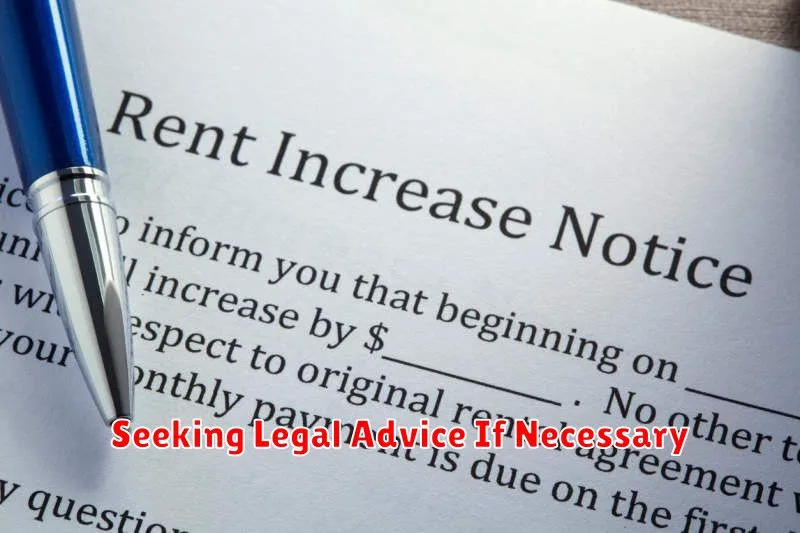
While it’s generally within a landlord’s right to raise rent, there are certain situations where seeking legal advice may be necessary. If you believe your rent increase is unreasonable or violates local rent control laws, consult with a legal professional. They can assess your specific circumstances, inform you of your rights, and help you take appropriate action.
For instance, if you’re facing a rent increase that seems significantly higher than the market rate or exceeds any legal limitations, legal advice can be valuable. Similarly, if you believe the rent increase is retaliatory due to your request for repairs or other legitimate reasons, legal counsel can provide guidance on how to proceed.
Remember, understanding your rights and responsibilities as a tenant is crucial. Seeking legal advice when necessary can help ensure that your rights are protected and that you navigate any disputes with your landlord fairly and effectively.
Rent Increase Notice Period
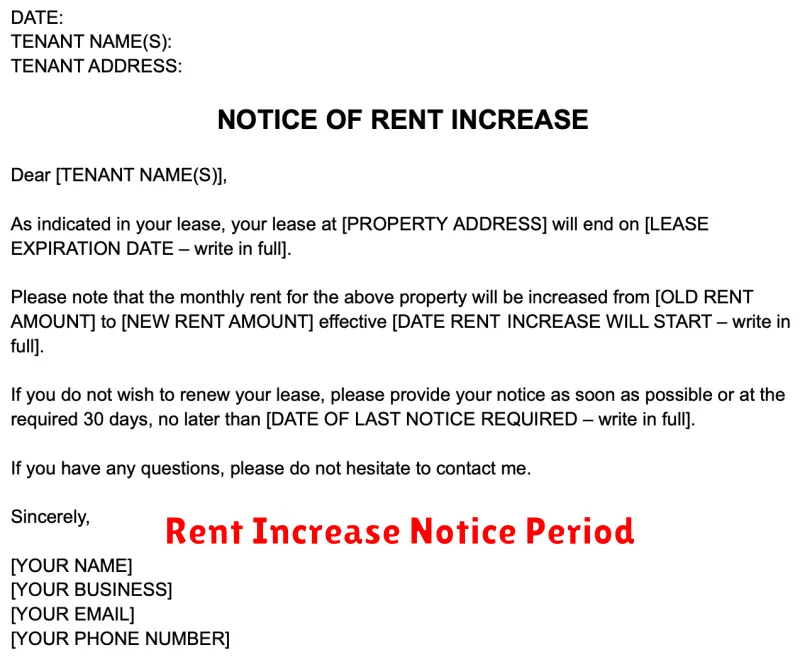
Landlords are required to provide tenants with a written notice of a rent increase. The notice period for rent increases varies depending on the state and local laws. It is important to understand the notice period in your area to ensure you are aware of any potential rent increases and have enough time to prepare.
Typically, the notice period is 30 to 60 days. This means the landlord must provide written notice of the rent increase at least 30 to 60 days before the new rent takes effect. The notice should include the amount of the rent increase and the effective date of the increase. It is crucial to keep a record of this notice for your own records.
Failure to provide adequate notice may result in the landlord being unable to enforce the rent increase. If you believe your landlord has not followed the proper procedures for rent increases, consult with a legal professional to understand your rights and options.
Reasons for Rent Increase
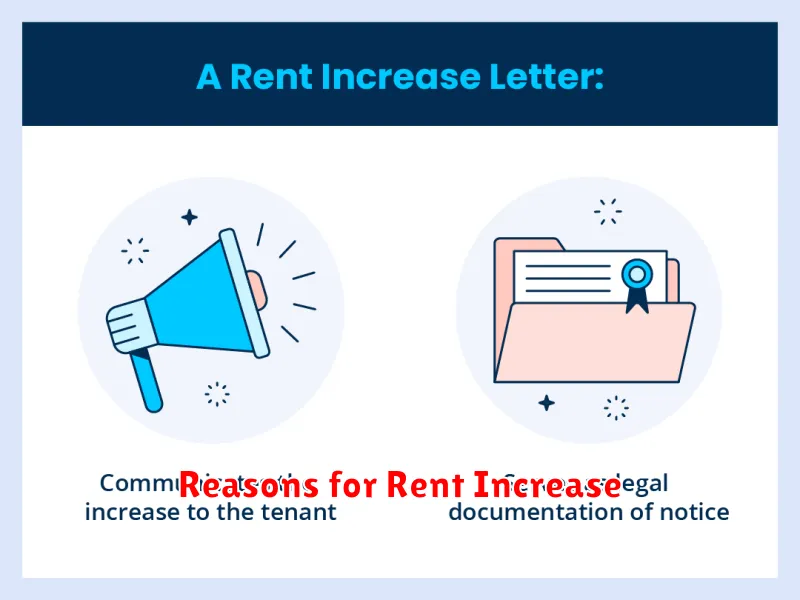
Rent increases are a common occurrence in the rental market, and they can be frustrating for tenants. But why do landlords raise rent? There are several reasons for rent increases, and understanding them can help tenants prepare for potential increases and negotiate with landlords. Here are some of the most common reasons:
Rising Operating Costs: Landlords have to cover expenses like property taxes, insurance, maintenance, and utilities. When these costs rise, landlords may need to increase rent to maintain profitability.
Increased Demand: When demand for apartments in a particular area is high, landlords can command higher rents. This is especially true in popular or desirable neighborhoods, where competition for rental units is fierce.
Inflation: Like all goods and services, rental prices are also subject to inflation. As the cost of living rises, landlords may adjust rents to keep pace with the increased cost of goods and services.
Market Conditions: Rental rates are often determined by market conditions. If rents in a specific area are rising, landlords may adjust their rates to stay competitive. Conversely, if rents are falling, landlords may offer lower rates to attract tenants.
Improvements and Upgrades: When landlords make significant improvements to their property, such as renovating apartments or adding amenities, they may increase rent to recoup the cost of these upgrades.
Lease Renewal: Some landlords may raise rent during lease renewals. While they may not be required to do so, it is a common practice, especially if market conditions or operating costs have changed since the initial lease was signed.
It’s important for tenants to understand that rent increases are often unavoidable. By staying informed about market conditions and communicating with landlords, tenants can better prepare for potential increases and potentially negotiate more favorable rental terms.
Preparing for Rent Negotiation
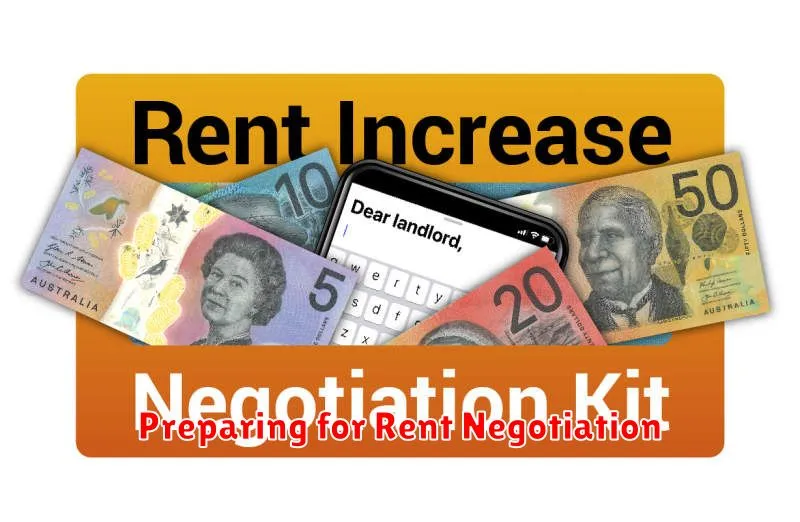
Before you even consider negotiating, it’s important to arm yourself with information. Research the average rent for similar apartments in your area. Websites like Zillow, Apartments.com, and Trulia can provide you with valuable data. You can also consult with a local real estate agent or property manager.
Next, take a close look at your lease agreement. Determine if there are any clauses that pertain to rent increases. Your lease may have a specific formula for rent adjustments, or it might state that your rent can be increased based on market conditions. If you have a lease renewal coming up, be aware that your landlord may be taking advantage of market fluctuations to increase rent.
Once you understand the rental market and your lease terms, you can begin to strategize your negotiation. Gather evidence to support your case, such as a recent rental appraisal or a report showing that similar apartments in your area have lower rental rates. Be prepared to explain why you believe your rent should not be increased or should be increased at a lower rate.
If you are a good tenant with a strong payment history and have maintained your apartment in good condition, this can be a strong negotiating point. Highlight your positive contributions to the property and be polite and respectful throughout the negotiation process.
Prepare for the possibility that your landlord will not be open to negotiating. If that happens, be ready to present your reasons for wanting to stay in your apartment. You may be willing to sign a longer lease term in exchange for a lower rent increase or offer to pay a slightly higher rent in return for a lease renewal with a fixed rent increase for a predetermined period.
Remember, rent negotiation requires a delicate balance of assertiveness and diplomacy. By researching, preparing, and staying calm, you can increase your chances of reaching a fair and mutually beneficial outcome.

